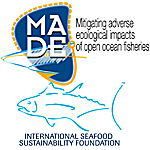Scientists from the Inter-American Tropical Tuna Commission (IATTC) in collaboration with the International Seafood Sustainability Foundation conducted a 73-day research cruise on board the Ecuadorian-flagged purse-seine vessel Yolanda L. during 11 May to 23 July, 2011. One objective during the cruise was to evaluate the captain's ability to accurately predict species composition, sizes, and quantities of tunas present at drifting FADs prior to setting.
Experimental procedures included the captain estimating the quantities (in tons) by species and size classes for skipjack, bigeye, and yellowfin tunas immediately prior to setting around a drifting FAD. The captain made estimates utilizing SONAR, Echo-sounder, visual observations, and radio communications with a crewman in a light boat, equipped with an echo-sounder, adjacent to the FAD. Tunas loaded from sets were partitioned in wells to facilitate tracking through the unloading and sorting process. IATTC personnel were present during the unloading of the vessel and the sorting process at the StarKist® GALAPESCA Facility in Manta, Ecuador. Weights by species and size classes provided by StarKist® were compiled to match three size classes utilized in the pre-set estimates. The measured quantities were compared to the captain's estimates and his accuracy evaluated. A total of eight purse-seine sets were evaluated and the results presented. Additionally, estimates of species composition by scientists utilizing a Simrad ES70 Echo-sounder and a SEABOTIX LBV 200 Remotely Operated Vehicle were compared to those of the captain's for 6 of 8 sets to evaluate potential improvements in accuracy with the use of additional equipment.
- Presentation

 PDF version
PDF version
